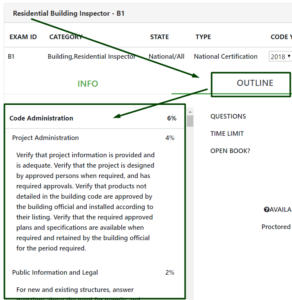
CREDENTIALING
Before the Exam
Here's how we develop our exams and some best practices for studying before AND during test day!
How Exams are Developed
01
Define the Job Scope
We begin with defining a job or profession, also called a scope of practice.
Professionals in the field develop the final scopes, subject matter experts, who form the Exam Development Committees (EDC). These scopes can be found on the Code Council Exam Catalog.
02
Define Job Tasks
Job tasks are based on the frequency and importance of the work in a given profession.
We define these tasks through surveying hundreds of individuals currently working in a given profession.
These job tasks must be performance-related, linked to the exam scope, based on written standards, and directly relevant to the protection of public health, safety and welfare.
03
Create the Exam
The EDC uses the job tasks to create the exam's blueprints, or Content Outlines.
The Content Outlines are used to create the actual exam forms.
So when you're looking for what's on your Code Council exam, start with reviewing the Content Outline for your exam on the Exam Catalog.
Here's an example of what the Outline looks like on the Exam Catalog. You'll notice it's broken down into its job content and task areas that you'll be tested on for your exam:
Exam questions are developed by the EDC based on the first printing of the code book.
All exam questions are presented in a four-option, multiple choice format, with one option on each question scored as correct.
While your exam will have content based on building codes, here are a few examples of how the questions are structured in the exam (with answers in bold):
What sea creature has eight legs?
- A whale
- A dolphin
- An octopus
- A crocodile
Given: A scientist needs to research colors not visible in a rainbow. The scientist would need to research which color?
- Red
- Teal
- Indigo
- Yellow
All of the following are planets except:
- Mars
- Orion
- Jupiter
- Mercury
How we set the score
National Certification Exam Scoring
For National Certification exams, a passing score is the score set by the Code Council and the EDC as the minimum score needed to pass the exam. This score is technically called a scale score and is set as 75.
Learn more about scaled scoring here.
Contractor/Trades Exam Scoring
For Contractor/Trades exams, a candidate must answer at least 70 or 75 percent of the questions correctly in order to pass the exam, depending on the exam title or jurisdiction.
Where to Start?
01
Decide Which Exam You Need to Take
Start with your local jurisdiction or employer: What requirements are needed for your job? Maybe it's a certification, license, or passing an exam relevant to your career.
Click below to explore additional information.
02
Search for your exam
Go to exam catalog ➔
03
Get in the Study Zone
- Create a Calendar – By creating a calendar of your study timeline before your exam day, you'll be able to make a realistic commitment of how much time you plan to study and what content you will focus on reviewing each day.
TIP: Planning what you are going to review each day helps mentally prepare for the exam - Review Your Exam's Content Outline – The exam content outline shows the major content and the job tasks that you're being tested on, including the weight (percentage of questions). This will help you decide how to best use your time in studying, as well what code sections or chapters require the most attention.
When you search for your exam in the exam catalog, click on the "Outline" column to view. See example.
TIP: Use your exam's outline to find where this information is in your book! - Appendix and Footnotes – Exam questions may reference the appendices of the reference material, as well as footnotes, exceptions, and other content integral to a task but not immediately obvious.
- Know Reference Material – Be very familiar with the content structure of the reference material. While the Code Council does not require prerequisites to take an exam, it is highly unlikely that someone with little knowledge of the codes or profession will pass an exam.
- Study all Climates – You will be tested on climate and geographical conditions represented by all regions in the United States when taking a National-based exam.
- Buy Code Books and References: Purchase books through the ICC Store, or view exam catalog for list of books to purchase
- Take Courses with ICC Training: The Code Council offers a variety of training options for every individual to earn continuing education units, learning units and/or Professional Development Hours (CEUs, LUs and/or PDHs) that can be used toward Code Council certification renewal. Explore ICC Training.
04
Exam Registration Tips
Taking a Certification Exam? Here are a few registration tips:
- Log in to myICC: You must be logged in to myICC to make an exam purchase.
- Pay Before You Schedule: You'll have one year to officially schedule or reschedule your purchased exam.
- Identification: You must enter your first and last LEGAL NAME exactly as it appears on your government-issued photo identification ready to show the proctor (e.g. driver's license, passport).
Continue Your Journey
Learn everything you need to know about during the exam.

Admin Rules and Policies
Be sure to review all rules and policies before exam day.
Questions? Contact Us
ICC Credentialing
Email: customersuccess@iccsafe.org
Phone: 1-888-ICC-SAFE (422-7233) ext. 0
Certification Policies
ICC understands the importance of impartiality in carrying out our certification activities, managing conflict of interest, and ensuring the objectivity of our certification activities.
To learn more about our certification and education policies, please read the following:
Council Policy 45, CC Rules of Procedure, Records Release, and ICC Credentialing Compliance Principles.



